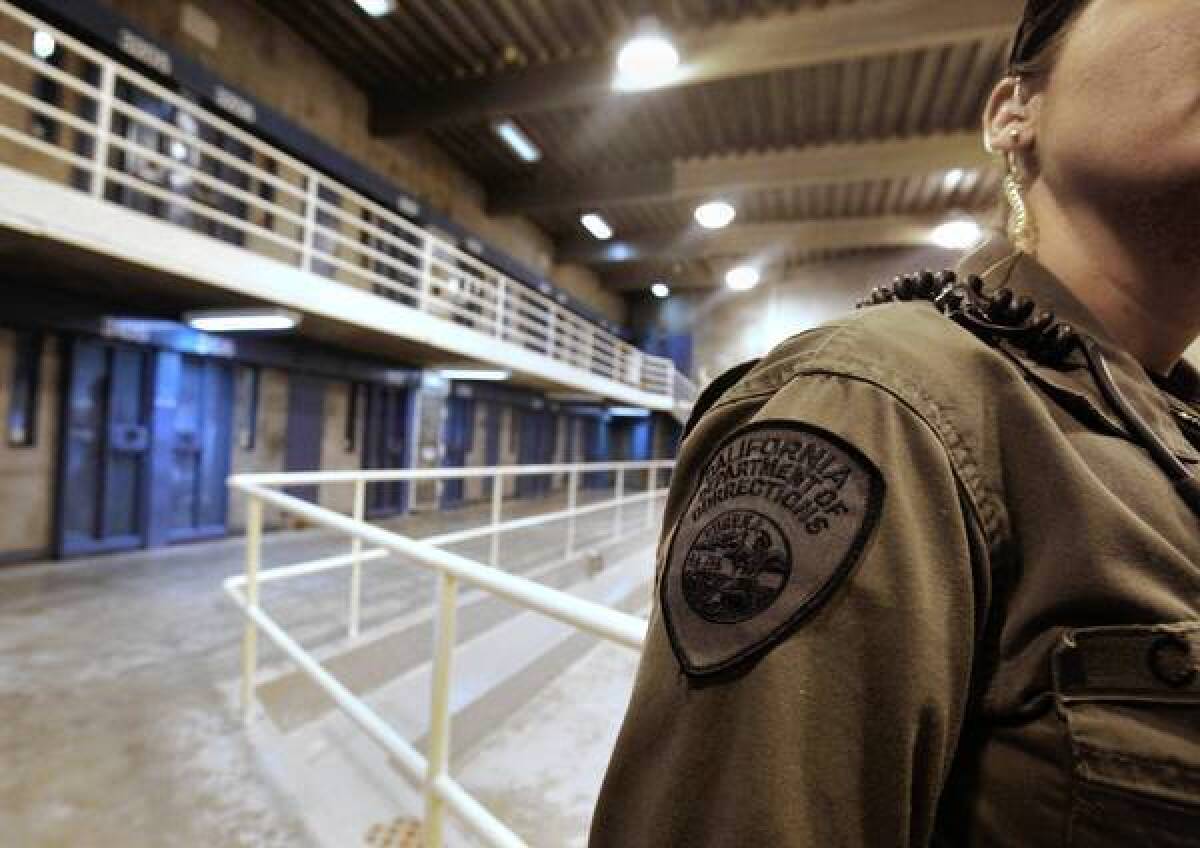Prisoners say jailers threaten retaliation over refusal to eat

- Share via
SACRAMENTO — State prisoners said Wednesday evening that corrections officials are threatening to search their cells, seize their food stashes and possibly move them to solitary confinement if they continue their meal strike.
Leaders of the protest said, through outside advocates, that they were prepared for such a crackdown, which would mirror actions taken in past hunger strikes.
Deborah Hoffman, lead spokeswoman for the California Department of Corrections and Rehabilitation, declined to confirm the measures described by inmates but said they “might be part of our normal policy.”
“There is a process in place when an inmate misses his ninth consecutive meal — and it is a process — it doesn’t all happen at once, can take days,” Hoffman said in an email.
Wednesday dinner was the ninth meal served since the protest began Monday at two-thirds of California’s prisons and among state offenders housed elsewhere. Nearly 29,000 inmates were continuing to reject meals, down from about 30,000 on Monday, with about 1,700 inmates still failing to go to their prison jobs or classes.
They are protesting solitary confinement conditions, food quality and what they describe as inadequate rehabilitation and education programs and a lack of warm clothing, among other issues.
Ten inmates at one facility, who had begun their own meal strike July 1, ended it and resumed eating Wednesday, officials said. Prison officials said they did not meet any of the strikers’ demands.
At other facilities, not all of those who were refusing meals were fasting, authorities said.
“Many of those inmates are … eating canteen,” said corrections spokesman Jeffrey Callison, referring to the instant soups and snack items inmates can buy from prison canteens.
The protest is the largest in California history, involving three times as many inmates as participated in hunger strikes two years ago. Those actions captured international attention, sparked public hearings and resulted in such changes as a five-year program for inmates to work their way out of solitary confinement.
The mass action originated at high-security Pelican Bay prison, near Oregon. Inmates there and at other prisons can be held in solitary confinement indefinitely; some have been there for decades. The prisoners seek a five-year isolation limit and want federal oversight of any agreement to end the protest, in addition to the other demands.
Inmates told The Times they were concerned that retaliatory measures would escalate what so far has been a quiet protest.
Threats of such steps had “been alluded to for several months” as the meal action was being planned, said Isaac Ontiveros of the Oakland-based Prisoner Hunger Strike Solidarity Coalition, an inmate advocacy group helping the prisoners circulate their demands.
Prison officials “stated that if they wanted the world to think they were going hungry, then it would be made so they were hungry,” an inmate at a central California facility said.
Another inmate said seizures would be unfair. “These food items aren’t the prisons’ food,” he complained. “It’s the inmates’ personal property, bought from the commissary.”
In addition to food confiscation, inmates said, they may be subject to mental health and medical evaluations, denied visitors and mail packages and subject to rules violations that could eventually affect their chances of winning parole.
The meal strike began as the state was under a federal court order to remove about 9,600 inmates from the prisons to ease crowding, which three federal judges say has led to inadequate inmate healthcare.
On Wednesday, Gov. Jerry Brown gave the judges a list of state laws and regulations that would have to be waived before he could begin releasing prisoners early, if necessary, to comply with their order. In a June ruling, the judges said they were waiving all laws that could block early releases.
Also Wednesday, Brown asked U.S. Supreme Court Justice Anthony M. Kennedy to excuse the state from the order. The governor argues that he needs time to appeal a federally imposed cap on inmate numbers before the high court and that to obey the order would mean releasing some “violent and serious offenders.”
Administration officials said Wednesday that the state had extended a contract with a private prison company that allows Brown to continue housing more than 8,200 inmates in other states for three years. But there is not enough money in the state budget for the full contract.
Brown’s lawyers have asked federal judges to clarify whether the governor can spend money without approval of the Legislature and whether the state can create or expand parole programs without lawmakers’ approval.
More to Read
Sign up for Essential California
The most important California stories and recommendations in your inbox every morning.
You may occasionally receive promotional content from the Los Angeles Times.











